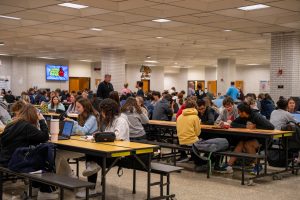A Study on Study Halls
While the purpose of a free period may seem evident, students opt to utilize their study halls in myriad ways.
Quinn Mulvaney, Michael Bistocchi Maria Kamarck, Hania Ahmad, Olivia Palmer and Mely Moreno spend their study hall chatting and doing their work. (credit: Olivia Shubak)
May 11, 2023
It’s hardly an uncommon sight: students frantically scratching down answers before class, cramming for a test in homeroom’s spare moments, or discreetly solving their calc problems during English. But the routine does get old. Juggling school, extracurriculars, and a social life can be a daunting task, so many students choose to add a study hall to their schedule. This year, there are 42 study halls on the roster at NASH, averaging three per period, according to the NASH School Counseling Office.
The U.S. Department of Education cites a report that study halls are proven to reduce the amount of incomplete homework by about 4%.
Study halls can be the life buoy of burnt-out students, offering a free period to relax, break up the day, or bring up the word count on that research paper.
“I have noise-canceling earbuds to block out the loudness of the conversations around me while I play video games or do homework,” Quinn Mulvaney, a NASH senior, said.
After all, study halls are the only class periods that allow students to choose how to spend their time.
“I do my math homework before class while I listen to the conversations at my table, and it works out well,” Olivia Palmer, a NASH junior said.
For most students, study halls serve, at least in part, as a time to complete their work. However, junior Hania Ahmad uses the time to not do work.
“I typically don’t use [study hall] to do homework,” she said. “It’s strictly a break because my classes are pretty demanding so I need a little ‘me’ time.”
Olivia Stewart, a current junior, expressed her regret over not taking a study hall for this pivotal year.
“I wish I had [taken one] because I have so much homework piled up once I get home and it becomes overwhelming,” she said.
Students with heavy after-school time commitments may add a study hall as a strategic decision as well.
“I try to finish my work so that I have less to do when I get home from dance,” junior Maria Kamarck said.
Junior Gabby Stegeman, a gymnast for the school, attests that her study hall is spent productively.
“When I get home from gymnastics, I’m almost completely done with my homework,” she said.
NASH junior Larkin Brown has deliberately never included a study hall in her schedule so that she can pursue all of her interests through the unique electives that NASH has to offer.
“At the beginning of freshman year, my counselor added one to my schedule, but I took it out because and signed up for Manufacturing instead,” she said. “Now I don’t have any room because I participate in chamber choir.”
Although students cannot choose the timing of their study halls, some like Ian Schoedel get particularly fortunate.
“I had gym first period and a full-year study hall right after, so I’d take my time instead of rushing like everyone else,” Schoedel said.
Senior Michael Bistocchi told the Uproar how he allots study hall time for the important stuff.
“We gossip, buy food from the vending machine, and complain when we don’t get our work done after,” Bistocchi said.













